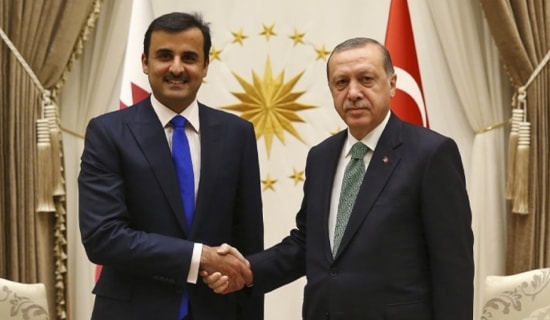Among the avid viewers of the FIFA World Cup currently underway in Brazil are those in Arab and Muslim countries. This year, Algeria advanced to the tournament, the only Arab team to do so; many in the Arab world were proud that it made it as far as the round of 16.[1]
The enjoyment of football seems, however, to be unacceptable in extremist Salafi circles. Prior to and during the World Cup, Salafi clerics in Saudi Arabia and Egypt issued fatwas and statements attacking the game and claiming that watching World Cup matches was reprehensible.
In contrast, Al-Azhar clerics hastened to stress that there was no harm in watching football matches and that extremists banning this should be ignored.
Also criticizing extreme Salafi positions on watching football matches were a number of columnists who noted that the World Cup was enjoyed across the Arab world by people who are subject to many hardships and who witness horrors in their home countries.
Most in the Arab world appear to be ignoring these Salafi fatwas; some viewers even watch the free World Cup broadcasts on Israeli TV and thus avoid purchasing pricy packages from Arab networks.[2] Additionally, many Twitter users are mocking the extremist sheikhs over the ban.
The following are statements and fatwas by Salafi sheikhs against watching World Cup matches, and criticism and ridicule of the fatwas.
Salafi Sheikhs: Watching Football Is Reprehensible And A Tragedy For Muslims
Prior to and during the World Cup, Saudi and Egyptian Salafi sheikhs expressed reservations regarding the sport as well as their concern that many Muslims would spend time in front of the TV and abandon their religious duties, in addition to subjecting themselves to negative influences. On his website on May 21, 2014, Saudi cleric Sheikh 'Abd Al-Rahman Al-Barrak issued a fatwa stating: "There is no doubt that football, played according to [the accepted international rules], has caused Muslims to adopt some of the customs of the enemies of Islam, who are [preoccupied with] games and frivolity. [This game] causes many abominable and corrupt acts..."[3]

Al-Barrak's fatwa (albarrak.islamlight.net)
Another Saudi sheikh, Saleh Al-Fawzan, who is a member of the Permanent Committee for Islamic Research and Issuing Fatwas and of Saudi Arabia's Council of Senior Clerics, stressed the ban on watching football matches during the month of Ramadan, which this year began June 29. Al-Fawzan claimed that having anything to do with football during Ramadan was harmful and a waste of time, and that it was a massive loss to Muslims. Therefore, he said, Muslims may not watch World Cup matches, especially when there is a chance that they might miss some of the prayers during the holy month. He said: "Muslims must set aside games and frivolity and take up God's work. They must not waste their time following games and frivolity, especially not during the blessed month of Ramadan. This is true for Muslims in general, and the younger generation in particular... These games have no use, and they are harmful and a waste of time..."[4]
The imam of the Al-'Izz bin 'Abd Al-Salam mosque in Riyadh, Sheikh Muhammad Al-Habdan, also rebuked Muslims for watching the World Cup. He tweeted that the great Medieval Muslim scholar Ibn Taymiyya used to close his eyes whenever he saw a Christian, so as not to see one who slanders God (i.e., by claiming the Jesus is the son of God).

Sheikh Al-Habdan's tweet (Twitter.com/dr_alhabdan, June 9, 2014)
Two years ago, Egyptian Salafi Sheikh Abu Ishaq Al-Heweny provided a religious explanation for the ban on watching football matches. He quoted a tradition by the Prophet Muhammad that states that "every game one plays is futile except for archery, training one's horse, and playing with one's wife [foreplay and kissing]." Al-Heweny added that, in light of the harsh situation of the ummah, watching football is not just a neutral act – meaning an act that Allah neither rewards nor punishes – but a reprehensible act, since Muslims should focus on more important matters than sitting in front of the TV.[5]
The start of the World Cup on June 13 sparked a public debate in Egypt, beginning with comments on the game by Sheikh Yasser Al-Borhamy, a leader and founder of the Egyptian Al-Da'wa Al-Salafiyya movement. A video posted online shows Al-Borhamy telling a crowd that football is "a tragedy that angers me greatly... [even though] we do not forbid [football] except in certain conditions, [such as] if it distracts from carrying out duties or triggers forbidden acts like extreme fandom and worship [of a team or player], immodest dress, or showing affection or friendship towards infidels and hypocrites. Football games are a kind of powerful distraction, that makes a person forget everything a Muslim must [do] for his religion, his ummah, and the building of his character. I stress that those who occupy themselves [with football] have fallen [into the trap of] doing something forbidden."[6]

Middle East extremism gives thinking minds a red card (Al-Sharq Al-Awsat, London, June 26, 2014)
Al-Azhar: Anyone Who Bans Watching Football Does Not Understand The Spirit Of Islam
In response to Al-Borhamy's statements, sheikhs from Al-Azhar hastened to emphasize that there was nothing wrong with watching football, and even went so far as to condemn Al-Borhamy. Dr. Muhammad Rafat 'Othman, a member of Al-Azhar's Council of Senior Scholars, said: "One is not forbidden from spending some of his time entertaining his spirit by watching anything that enlivens one, so long as it is not forbidden sights. We cannot easily accept the statement that watching matches causes a love of infidels, since Muslims are not forbidden from respecting non-Muslims so long as [the latter] do not attack them."
Dr. Magdy 'Ashour, advisor to the Grand Mufti of Egypt, also condemned Al-Borhamy's fatwa, saying: "Watching matches is permitted and has nothing to do with anything banned [by Islam]." Also, Dr. 'Adballah Al-Najjar, a member of Al-Azhar's Academy of Islamic Studies, said: "Anyone who says that sports are forbidden does not understand Islam and is disconnected from the religion."[7]
Arab Columnists: Instead Of Religious Extremism And Painful Current Affairs, Let People Enjoy Football
'Ali Al-Sharimi, columnist for the Saudi daily Al-Watan, joined the criticism of the fatwas forbidding watching football matches. He wrote: "Fatwas banning football are not new. Two years ago, a preacher here [in Saudi Arabia] ruled against the game, calling it 'a Freemason game.'[8] The most famous text relied on by the anti-football fatwas was released in 2003 by Sheikh 'Abdallah Najdi... It sets various bizarre conditions and rules, including a ban on ruling fouls, penalty kicks, and corner kicks; banning numbered player jerseys; and banning yellow and red cards...
"I ask: Does Islam forbid entertainment? Why are some clerics' fatwas limited to combating joy and killing happiness? Why issue so many fatwas setting strict rules and bans, and harassing [people and] overwhelming [them with Islam]? Why do some of these fatwas play such a negative role and make Muslim life hated and full of hardship and suffering?
"Some fatwas... strip a man of his freedom of choice and will... They persecute him on every matter, large or small, and in every move or absence of move. [Two kinds of fatwas] – the strict fatwas that ban most of the pleasures and forms of entertainment that Allah permitted to his slaves [Muslims], and the inciting fatwas that push young people to perdition and spread the culture of 'blowing yourself up' while exalting the value of death and minimizing the value of life – have stolen our sons from their families, from the schools, and from the pleasures in their life, and have pushed them into the arenas of death."[9]
Ata'ollah Mohajerani, an Iranian writer for the London-based Saudi daily Al-Sharq Al-Awsat and former minister of Culture and Islamic Guidance under Iranian president Mohammad Khatami, also justified watching the World Cup as respite from the difficult political upheavals in the Arab world: "It seems that these days, young people around the world have forgotten politics and are focusing on football, with hundreds of millions of eyes glued to TV screens." He then compares politics and football, claiming that the latter represents the lofty ideals abandoned by the former – such as transparency, with the numerous camera angles and the ability to capture every moment on the pitch; equality, with the same number of players on each team and rules that apply to all; and respect, for referee decisions. In contrast, he says, in politics, it is history, not a living person, that is the ultimate judge, and while members of the media may judge, if they cross certain boundaries they could be imprisoned – something that never happens in football.
In closing, Mohajerani recommends taking a break from current affairs: "Instead of watching youths in Iraq kill each other for false aims and watching the destruction of Syria, sometimes we are better off watching football as a breath of fresh air..."[10]

Yes to the World Cup; no to news from the bloody Middle East (Al-Arabi Al-Jadid, London, June 19, 2014)

Syrian refugee tries to take comfort in World Cup (emissa2012.com, June 15, 2014)
Tweets Mock Anti-Football Fatwas
Twitter users did more than disregard these strict fatwas; they used the Twitter hashtag "Islamic_Football" to tag tweets ridiculing Islamists and their aversion to football. Some invented impossible rules mocking extremist Islamic world views:
"Replace the ball with the heads of 'Alawis, Shi'ites, or Christians – but not Jews"

Twitter.com/sameeralyousef, June 14, 2014
"Some of the stands in the stadium should be reserved for female fans from the sexual jihad brigades, who will give themselves to the winning team after the match.

Twitter.com/m_azim59, June 14, 2014
"The corner flags should be replaced by the flag below, [of the Islamic State of Iraq and Syria]"

Twitter.com/aboawad98, June 14, 2014
"Any [player] who retreats during an offense will be treated as though he withdrew from the fold of Islam and punished with beheading"

Twitter.com/Momen0o, June 14, 2014
Endnotes:
[1] Al-Quds Al-Arabi (London), June 27, 2014.
[2] The Lebanese daily Al-Nahar reported on June 16, 2014 that most residents of South Lebanon, a majority of whom support Hizbullah, watched these Israeli broadcasts, and noted the bizarre juxtaposition of hearing the Israeli announcers' commentary in Hebrew from the television and calls to prayer from the mosques outside.
[3] See MEMRI Special Dispatch No. 5763, Saudi Sheikh: Football Is A Moral, Social, And Public Abomination, June 11, 2014.
[4] Almoslim.net, June 26, 2014.
[5] YouTube.com/jtAQf5sKc48, May 15, 2012. This video was uploaded around the time of the recent European Football Championship and was taken from a show on the Egyptian Al-Nas TV channel, which was shut down after the ousting of Muhammad Mursi.
[6] Al-Ahram (Egypt), June 15, 2014.
[7] Al-Ahram Al-Arabi (Egypt), June 24, 2014.
[8] Probably referring to Sheikh Suleiman bin Nasser Al-'Alwan. See MEMRI Special Dispatch No. 5129, "Fatwa By Saudi Sheikh: Soccer Players Are Infidels," January 10, 2013.
[9] Al-Watan (Saudi Arabia), June 19, 2014.
[10] Al-Sharq Al-Awsat (London), June 23, 2014.




